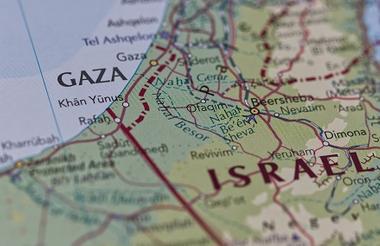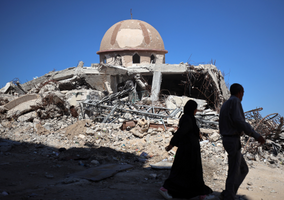The Disasters Emergency Committee (DEC) has said its ongoing Middle East Humanitarian Appeal has raised over £47m so far.
The appeal, which is match-funded by the government up to the value of £10m, was launched in October 2024 in response to the conflicts in Gaza and Lebanon.
In an update posted yesterday, DEC said “the catastrophic humanitarian crisis in Gaza continues to deteriorate”, but donations to the appeal are making a difference and helping its member charities and local partners reach people with lifesaving aid.
A DEC spokesperson told Civil Society: “More funding is urgently needed to continue reaching as many people as possible, as well as to ensure they’re ready to rapidly scale up their work as soon as they’re able to.”
The United Nations recently estimated that $4bn (around £3bn) worth of aid is needed this year to address the most urgent needs in the Occupied Palestinian Territory.
DEC’s spokesperson said that “right now, this is only 20% funded”.
Last month, the Integrated Food Security Phase Classification, a global initiative that assesses the severity and extent of food insecurity and malnutrition in countries, warned that “the worst-case scenario of famine is currently playing out in the Gaza Strip”.
‘Everyone in urgent need of humanitarian support’
DEC said its member charities, which include ActionAid and Oxfam among others, are doing “everything they can to make the most of temporary pauses in the conflict to deliver food, clean water and basic supplies”.
“Safe and sustained access for humanitarian aid has never been so urgent,” it said.
“The extraordinary challenges around aid delivery in Gaza have had a devastating impact on them over the past months.
“With extremely limited supplies of food, fuel and medicine, they’ve been unable to carry out much of their lifesaving work.”
DEC’s spokesperson added that the scale of need in Gaza is “vast and rapidly increasing” and “everyone is in urgent need of humanitarian support”.
“With extremely limited access to food, clean water and medical care, reports of people – particularly children – dying from starvation and malnutrition are rising,” they said.
“Many families are spending days without a meal. When limited goods are available to buy in local markets, the prices are so high that they are out of reach.
“Most people have been displaced multiple times, and huge numbers are living in desperately harsh conditions in overcrowded camps and shelter sites.”
Ongoing restrictions
DEC charities and local partners have been working hard to continue providing crucial support, including clean water, medical care and cash assistance, to the people in Gaza.
However, the spokesperson said the ongoing restrictions around access for humanitarian aid have “a devastating impact on DEC charities and their local partners’ ability to meet the urgent needs”.
“Although a few have been distributing some hot meals and nutrition support, without supplies entering Gaza, most are now unable to provide the food that so many had been relying on,” they said.
“With severe shortages of fuel and restrictions on movement, delivering clean water is more difficult than ever.”
They added that Gaza’s healthcare system “has been decimated”, while “a dire shortage of fuel means the few hospitals that are still operating are forced to make impossible decisions about who they can treat”.
“The remaining supplies of medicine and baby formula are running critically low.
“Through everything, frontline staff and their families are living in unimaginably harsh conditions and facing significant risks as they carry out their life-saving work.”
‘Catastrophic’ humanitarian crisis
DEC’s chief executive Saleh Saeed told Civil Society: “The humanitarian crisis in Gaza right now is catastrophic.
“DEC charities and their incredible local staff and partners are doing everything they can in unimaginably dire conditions to continue delivering whatever support is possible, but it’s clear that the need for safe and sustained access for humanitarian aid has never been more urgent.
“Despite the enormous challenges, donations to the Middle East Humanitarian Appeal are making a difference to people in desperate need of aid, and we’re incredibly grateful for the UK public’s ongoing generosity donating to this crisis.”
Related articles











